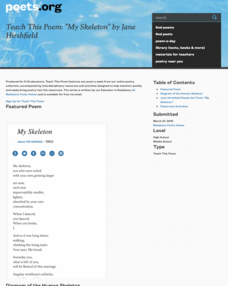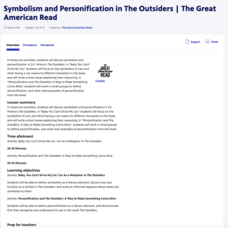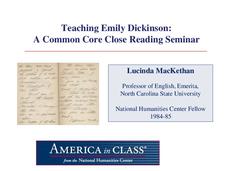Learning for Justice
Maya Angelou
Maya Angelou's poem, "Still I Rise", offers young scholars an opportunity to consider how poets use literary devices to create powerful messages. After a close reading and discussion of the poem, class members reflect on how they can...
Simon & Schuster
Classroom Activities for The Odyssey by Homer
A 15-page packet details three activities designed to engage scholars in Homer's The Odyssey. As they read, pupils use a graphic organizer to record examples of several literary terms found in The Odyssey and contemporary culture. Groups...
Academy of American Poets
Teach This Poem: "My Skeleton" by Jane Hirshfield
Jane Hirshfield's poem "My Skeleton" asks readers to pause and think about the amazing, often taken-for-granted structure that protects and gives form to human bodies. After observing the human skeleton's image, class members read the...
Academy of American Poets
Teaching the Vietnam War with Poetry and Archives
The language of and the perspective of photographs, poems, and official reports differ. After a close reading of two photographs, two poems, and a military report about the Vietnam War, individuals adopt someone's voice or something from...
EBSCO Industries
Music and Poetry
Song lyrics, like poems, are meant to be heard. After examining the literary devices in several poems, scholars examine the lyrics of popular songs and identify the sound devices and the figurative language writers use to create the...
Poetry Society
Writing a Personification List Poem
After a close reading of Sylvia Plath's "Mirror" and Flora de Falbe's "Five Things About the Lake," young poets craft their own personification list poem about a very special place.
Ereading Worksheets
Figurative Language for Edgar Allen Poe
Are your classes weary of dreary worksheets? Are the learners nearly napping? Thrill them, fill them with delight with an interactive worksheet that asks them to identify the figurative language Edgar Allen Poe uses to add horror and...
PBS
Symbolism and Personification in The Outsiders
A shirt can't really swallow you—right? Readers find examples of symbolism and personification in S.E. Hinton's The Outsiders with two straightforward lessons.
Film Education
The Jungle Book
Accompany a viewing of Disney's live-action feature film, The Jungle Book, with a packet equipped with several activities focused on story elements. Scholars discuss and complete diagrams and charts about the movie's characters, setting,...
Curated OER
Poetry Analysis Sheet
Tasking class members to analyze a poem can strike fear into the hearts of many learners. Here's a activity that takes the mystery out of the process by providing questions about what to look for in the text and to the devices poets use...
Poetry4kids
Personification Poetry Lesson Plan
Scholars take part in two exercises to boost their knowledge of personification. After reading a detailed description and excerpts from famous poems, writers list action verbs and objects then combine words to create a humorous...
Poetry4kids
How to Write a Free Verse Poem
Budding poets compose an original free verse poem. Encouraged to use personification and alliteration, scholars read over three tips and examples then try their hand at drafting a poem of their own style.
Reed Novel Studies
Tracker: Novel Study
Most deer are born with white spots that disappear as they grow. An interesting novel study for Gary Paulsen's Tracker shares more fascinating facts about the majestic animals. Readers also complete a vocabulary activity, solve anagrams,...
Reed Novel Studies
To Kill a Mockingbird: Novel Study
Edgar Rice Burroughs was an American fiction writer whose biggest claim to fame was the creation of Tarzan. Using the novel study for Harper Lee's beloved novel, To Kill a Mockingbird, pupils research and list facts about him or another...
Reed Novel Studies
Tales of a Fourth Grade Nothing: Novel Study
Many turtle species can retreat their heads into their shells when threatened by predators. With the Tales of a Fourth Grade Nothing novel study, pupils conduct research to uncover other interesting turtle facts. As they explore Judy...
Reed Novel Studies
The Summer of Riley: Novel Study
The Labrador retriever is America's most popular dog breed. With the novel study for The Summer of Riley by Eve Bunting, scholars learn more about the sweet, lovable animal. Additionally, they write quatrain poems, explore foreshadowing...
Reed Novel Studies
The Sisters Grimm: Novel Study
Author Michael Buckley's novel The Sisters Grimm features two fairy-tale sleuths who are tasked with stopping a giant from destroying their town. Using the novel study, individuals acquire new vocabulary and answer comprehension...
Reed Novel Studies
Mrs. Frisby and the Rats of NIMH: Novel Study
The field mouse, also known as the meadow vole, is most active at night, so hide the cheese! Scholars research these interesting rodents and record three fascinating facts using the novel study for Mrs. Frisby and the Rats of NIMH. They...
Reed Novel Studies
Of Mice and Men: Novel Study
Why is personification such a popular literary device for many authors? Learners answer the question as they engage in activities from the novel study for the classic Of Mice and Men. They also scan the novel to find examples of the...
Deer Valley Unified School District
Close Reading: Analyzing Mood and Tone
The AP Literature and Composition exam is all about close reading. Test takers are presented with a passage and asked to analyze how an author uses literary devices to create a desired effect. Prepare your students for the exam with a...
California Federation of Chaparral Poets, Inc
Poetic Devices
Have everything you need to know about the elements of poetry with a nine-page handout. Split into four categories—word sounds, meanings, arrangement, and imagery—budding poets may reference terms, read definitions, descriptions, and...
National Humanities Center
Teaching Emily Dickinson: A Common Core Close Reading Seminar
Three of Emily Dickinson's poems, "I like to see it," "Because I could not stop for Death," and "We grow accustomed to the Dark," provide instructors with an opportunity to model for class members how to use close reading strategies to...
Library of Congress
The Story of The Three Little Pigs
Bring the 1904 version of the classic kid's tale, The Story of the Three Little Pigs to your young readers. With original drawings by L. Leslie Brooke, young reader take a step into a world where pigs can talk and a wolf is big and bad.
E Reading Games
Orpheus the Lyrical – Figurative Language Review Game
Turn grammar practice into a game, a video game this is! Scholars show what they know about figurative language with a video game that takes them through a land filled with coins, magic, and animals. Concepts include similes, metaphors,...



















